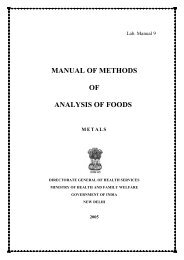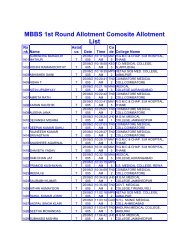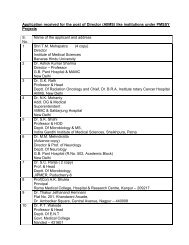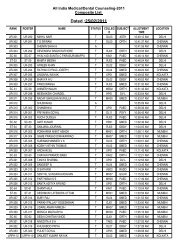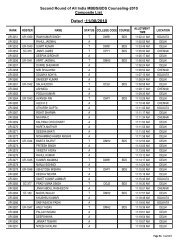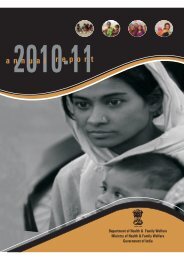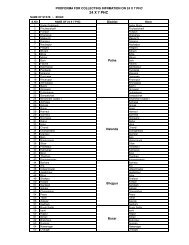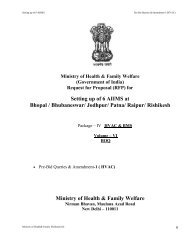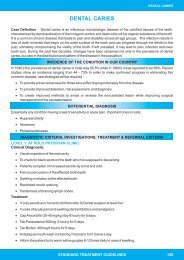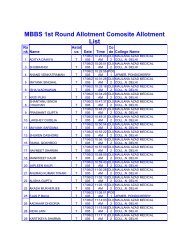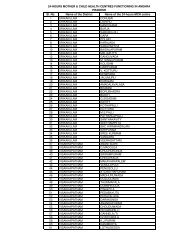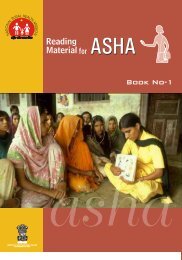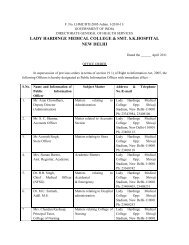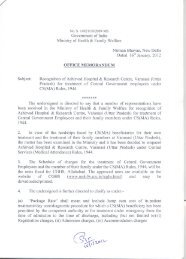National Vaccine Policy Book - Ministry of Health and Family Welfare
National Vaccine Policy Book - Ministry of Health and Family Welfare
National Vaccine Policy Book - Ministry of Health and Family Welfare
You also want an ePaper? Increase the reach of your titles
YUMPU automatically turns print PDFs into web optimized ePapers that Google loves.
• The vaccine gr<strong>and</strong> challenge mechanism will ensure that all<br />
varied type <strong>of</strong> infrastructures <strong>and</strong> services, approved by Central<br />
Drugs St<strong>and</strong>ard Control Organization (CDSCO) are available,<br />
accessible, <strong>and</strong> affordable to the investigators involved in vaccine<br />
research <strong>and</strong> development.<br />
• Flexible governance <strong>and</strong> granting systems should be in place to<br />
ensure that additional science funding, cooperate granting<br />
system (where funding agency, project managers <strong>and</strong><br />
investigators work as a team for collective decision making) <strong>and</strong><br />
subcontracting mechanisms are in place.<br />
• Enabling processes for rapid decision-making to allow building<br />
alliances <strong>and</strong> partnerships, both national <strong>and</strong> global, <strong>and</strong> for<br />
support to agencies for diffusion <strong>of</strong> the technologies into the social<br />
systems, should be in place.<br />
• Workable mechanisms need to be developed to sustain vaccine<br />
development teams, for a decade or more, for a continuity <strong>and</strong><br />
focus, <strong>and</strong> new skills incorporated to fulfill evolving requirements.<br />
4.1.1. Mapping <strong>of</strong> research capacity <strong>and</strong> network<br />
The mapping <strong>of</strong> vaccine R&D activities in the country is important to<br />
assess the strengths <strong>and</strong> gaps, <strong>and</strong> to avoid duplication <strong>of</strong> efforts.<br />
This exercise also helps identify c<strong>and</strong>idates that have potential <strong>and</strong><br />
should be taken forward <strong>and</strong> quickly abort/correct those activities<br />
that have lacunae. Mapping exercises are very important in case <strong>of</strong><br />
vaccines, where the pipeline <strong>of</strong> c<strong>and</strong>idates has to be large <strong>and</strong> the<br />
development resource-intensive.<br />
The participation <strong>of</strong> national government institutions, private<br />
institutions <strong>and</strong> industries that have resources <strong>and</strong> manpower in the<br />
area <strong>of</strong> health research should be given a platform to share ideas <strong>and</strong><br />
intellectual property <strong>and</strong> encouraged to collaborate. These groups<br />
when identified to have common goals should be encouraged to<br />
write joint grants <strong>and</strong> thus utilize the infrastructure <strong>and</strong> manpower to<br />
the optimum capacity. The results <strong>of</strong> mapping exercise should be<br />
made available to researchers in the country <strong>and</strong> to other funding<br />
agencies investing in similar activities.<br />
The mapping exercise could result in disease or intervention (drug/<br />
vaccine/ delivery systems/adjuvants) specific networks that could<br />
synergize the efforts <strong>and</strong> enable concentration <strong>of</strong> resources, both<br />
monetary <strong>and</strong> human, towards fight against a specific disease or a<br />
group <strong>of</strong> diseases (for example a network <strong>of</strong> neglected tropical<br />
diseases).<br />
• These networks could then collaborate within themselves, share<br />
intellectual property, expertise, biological material <strong>and</strong> also<br />
collaborate with international groups working on similar projects.<br />
• Creation <strong>of</strong> Sophisticated <strong>and</strong> Analytical Instrument Facilities<br />
(SAIF) within a region/state will encourage sharing <strong>of</strong> expensive<br />
instruments <strong>and</strong> enable participation <strong>of</strong> investigators from various<br />
universities <strong>and</strong> institutions. This will also enable periodic<br />
upgradation <strong>of</strong> the facilities.<br />
4.1.2. Creation <strong>of</strong> Bio-repositories<br />
Banking <strong>of</strong> biological samples both sera <strong>and</strong> organisms that are<br />
collected during diseases surveillance, epidemics or clinical trials<br />
can be a tremendous source <strong>of</strong> materials for retrospective use in<br />
identifying biomarkers, genetic make-up or studying changes in<br />
pathogenic organisms in India in case <strong>of</strong> re-emergence <strong>of</strong> a disease.<br />
Administration, management, custodianship, <strong>and</strong> security <strong>of</strong> biobanks<br />
can be major issues. Without proper guidelines <strong>and</strong> policies<br />
about benefit-sharing, data-sharing, privacy, access (both for<br />
depositing <strong>of</strong> samples <strong>and</strong> retrieval), policies to h<strong>and</strong>le bio-piracy<br />
etc., a well intended effort can not function optimally.<br />
• The existing guidelines that govern the functioning <strong>of</strong> a <strong>National</strong><br />
Biorepository in India <strong>and</strong> the best practices followed in other<br />
countries should be examined <strong>and</strong> an India specific St<strong>and</strong>ard<br />
Operating Procedure <strong>and</strong> Guidelines needs to be drafted with<br />
appropriate linkages with different programs,<br />
• The bio-repositories need to be equipped with fingerprinting,<br />
sequencing for analysis <strong>of</strong> the genetic makeup <strong>of</strong> the organism,<br />
<strong>and</strong> freeze-drying facility for long-term storage,<br />
• The repositories should be accredited <strong>and</strong> linked with<br />
International Repository System <strong>and</strong> to other discovery research<br />
units in the country,<br />
• There is an urgent need to establish a repository for pathogenic<br />
organisms. All the data sets generated should be strongly linked<br />
with other national programs.<br />
08 09



